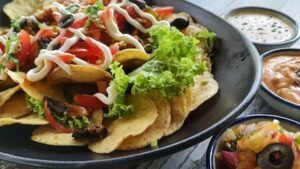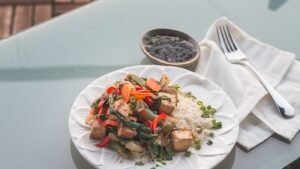
How to Lose Weight with a Vegan Diet

Veganism has grown in popularity in recent years, with many people adopting this lifestyle for a variety of reasons, including health benefits and ethical considerations.
Table of Contents
Introduction
Contrary to popular assumption, a well-planned vegan diet can contain all of the necessary nutrients while also assisting in weight loss. This article will go over the essentials of a vegan diet for weight loss, such as its benefits, key considerations, and practical weight loss suggestions.

What Exactly is a Vegan Diet?
A vegan diet is a plant-based diet that avoids all animal products, such as meat, chicken, fish, eggs, dairy, and honey. Individuals following a vegan diet focus on complete plant foods such as fruits, vegetables, whole grains, legumes, nuts, and seeds, excluding animal-derived items. These plant-based foods supply necessary nutrients such as carbs, proteins, lipids, fiber, vitamins, and minerals while avoiding the health hazards associated with animal-based products.
Weight Loss Advantages of a Vegan Diet

Adopting a vegan diet plan to lose weight has various benefits. For starters, plant-based foods are lower in calories and saturated fat than animal-based foods, aiding weight loss. A vegan diet high in fiber assists digestion, promotes satiety, and helps manage hunger, resulting in lower calorie intake. Vegan foods for weight loss are also high in vitamins, minerals, and antioxidants, all of which promote overall health and well-being. Plant-based diets have also been linked to a lower BMI, a lower risk of chronic diseases, and improved metabolic markers like blood pressure, blood sugar, and cholesterol levels.
Nutritional Considerations for Vegan Foods for Weight Loss

It is critical to pay attention to certain nutrients to establish a nutritionally balanced vegan diet plan to lose weight. While plant-based foods can provide the majority of nutrients, some require special consideration. Protein sources, for example, should be varied to ensure that all essential amino acids are provided. Legumes (such as beans, lentils, and chickpeas), tofu, tempeh, seitan, edamame, quinoa, and plant-based protein powders are examples of plant-based protein sources. Omega-3 fatty acids, which are found mostly in fish, can also be derived from plants such as flaxseeds, chia seeds, walnuts, and algae-based supplements. Iron-rich foods such as legumes, fortified cereals, and leafy greens aid in the prevention of deficiencies, while calcium can be gained via plant-based sources such as tofu, fortified plant-based milk, and leafy greens. Vitamin D can be absorbed from sunlight and fortified foods; however, vitamin B12 may necessitate supplementation or fortification because it is largely found in animal sources. Iodized salt, seaweed, and iodine-fortified foods are all good sources of iodine.
Creating a Vegan Diet Plan to Lose Weight
We must keep the following factors in consideration when creating an effective vegan diet plan to lose weight:
- Prioritize Whole Foods

When adopting vegan meals for weight loss, it is critical to prioritize whole, unprocessed foods. Whole foods are less refined and contain all of their natural nutrients and fiber. They are high in vitamins, minerals, and phytonutrients, which promote satiety, aid in weight loss, and improve general health. Colorful fruits and vegetables, whole grains like quinoa and brown rice, legumes, nuts, and seeds are all examples of whole foods. Individuals can lose weight while maintaining appropriate nutrition by focusing on these nutrient-dense foods.
- Macronutrient Balance

Vegan meals for weight loss need to have the correct macronutrient proportions of carbohydrates, proteins, and lipids. Carbs are the primary source of energy and should be obtained from complex carbs such as whole grains, starchy vegetables, and fruits. These contain fiber, vitamins, and minerals, as well as inducing satiety. Protein is necessary for weight loss since it promotes satiety, helps with muscle maintenance and repair, and speeds up metabolism. Legumes, tofu, tempeh, seitan, edamame, quinoa, and plant-based protein powders are all vegan protein sources. Nutrient absorption, hormone synthesis, and satiety all benefit from healthy fats. Choose plant-based fats such as avocados, nuts (almonds, walnuts, and pistachios), seeds (flaxseeds and chia seeds), and oils (olive oil and coconut oil). Balancing macronutrients ensures energy stability and aids in the management of cravings.
- Consuming Enough Protein

Protein is an important part of vegan meals for weight loss since it improves satiety, helps with muscle maintenance and repair, and boosts metabolism. To guarantee that all essential amino acids are received, a diversity of plant-based protein sources should be included. Legumes, such as beans, lentils, and chickpeas, are high in protein. Tofu, tempeh, and seitan are likewise high in protein and can be used in place of meat in a variety of cuisines. Quinoa is a complete protein source that can be used in a variety of recipes. Plant-based protein powders derived from sources such as peas, rice, or hemp can also be added to smoothies or used in baking. Individuals can ensure they meet their protein demands while enjoying a broad variety of delicious vegan meals by incorporating these different protein sources throughout the day.
- Making Fiber Consumption a Priority

Fiber is essential in a vegan diet plan to lose weight. It promotes weight loss by increasing satiety, controlling blood sugar levels, and promoting digestive health. Individuals can boost their weight loss attempts by eating fiber-rich foods. Fiber is abundant in fruits, vegetables, whole grains, legumes, nuts, and seeds. Consuming a range of these foods ensures a healthy balance of soluble and insoluble fiber, which provides several health advantages. Soluble fiber can be found in oats, chia seeds, and legumes, whereas insoluble fiber can be found in whole grains, vegetables, and nuts. These fiber-rich alternatives can be incorporated into meals and snacks throughout the day to promote satiety and aid in weight loss.
- Function of Healthy Fats

Healthy fats are essential for food absorption, hormone synthesis, and satiety in vegan meals for weight loss. While fats are high in calories, when ingested in moderation, they can help with weight loss. Saturated and trans fats should be avoided in favor of plant-based fats. Avocados, nuts (including almonds, walnuts, and pistachios), and seeds (including flaxseeds and chia seeds) are high in beneficial fats. These can be mixed into meals, salads, smoothies, or eaten alone as a snack. Plant-based oils such as olive oil and coconut oil can be used in cooking and as salad dressings. To minimize extra calorie consumption, it is vital to regulate fat consumption; however, using small amounts of healthy fats in a vegan weight loss diet can help to create a balanced and fulfilling eating plan.
- Monitoring Micronutrient Consumption
![]()
While a vegan diet can supply an abundance of micronutrients, certain nutrients must be monitored to guarantee optimal health and prevent shortages. Iron is an important nutrient, particularly for women, and it can be gained via plant-based sources such as legumes, fortified cereals, and leafy greens. Tofu, fortified plant-based milk, and leafy greens contain calcium, which is essential for bone health. Vitamin D can be derived from sunlight or fortified meals; however, vitamin B12 may necessitate supplementation or fortification because it is largely found in animal sources. Iodized salt, seaweed, and iodine-fortified foods are all good sources of iodine. Monitoring and treating these specific micronutrient demands might help you maintain your overall health while on a vegan diet plan to lose weight.
- Staying Hydrated

Proper hydration is essential for weight loss and overall health. Water is essential for digestion, metabolism, and hunger management. Aim to drink enough water throughout the day, taking into account factors such as physical activity, climate, and individual needs. In addition to water, hydrating meals such as fruits and vegetables can help with overall hydration while eating vegan meals for weight loss. Herbal teas and infused water are also tasty and calorie-free hydration options. Staying hydrated not only aids weight loss attempts but also promotes optimal body function and general health.
Practical Vegan Weight Loss Suggestions
If you want to lose weight on a vegan diet, keep the following factors in mind:
- Portion Management

While a vegan diet is high in nutrients, portion control is essential for weight loss. It is critical to be aware of portion sizes and to pay attention to your body’s hunger and fullness cues. Using smaller plates and bowls can give the appearance of a fuller plate. Mindful eating can also help you lose weight by savoring each bite, eating carefully, and paying attention to the flavors and textures of your meals. Individuals can better regulate their calorie intake and achieve their weight loss goals by adopting portion management and mindful eating.
- Meal Preparation and Planning

A helpful tip for a successful vegan diet for weight loss is to plan and prepare meals ahead of time. Individuals can assure a well-balanced and nutritious vegan diet while avoiding impulsive food choices by preparing meals and snacks ahead of time. Meal planning entails developing a weekly or monthly menu that takes into account nutrient requirements, personal tastes, and weight loss goals. It also aids in the creation of a shopping list, which promotes the purchase of healthy items and decreases the chance of relying on processed or unhealthy options. Preparing meals in bulk and storing them in portion-sized containers can help you save time while also encouraging healthy eating habits throughout the week. Meal planning and preparation can be tailored to individual schedules and interests, making it easier to stick to vegan foods for weight loss.
- Mindful Eating

Mindful eating is an excellent method for losing weight and improving overall health. It entails giving complete attention to the dining experience, being present in the moment, and activating all of one’s senses when eating. Mindful eating urges people to slow down, relish every bite, and pay attention to their bodies’ hunger and fullness cues while consuming vegan foods for weight loss. Individuals can create a healthier relationship with food, improve digestion, and increase meal satisfaction by eating thoughtfully. It also aids in the identification of emotional eating triggers and raises awareness of portion sizes and food choices.
Note: There might be affiliate links mentioned here. We may receive a commission if you purchase a product through an affiliate link. There is no additional charge for you. Please do your own research before making any online purchases.
- Managing Cravings and Hunger

Managing hunger and cravings is crucial to losing weight on a vegan diet. Vegan diets can include a range of satiating plant-based meals that aid in hunger control. Whole grains, legumes, and vegetables with high fiber content keep people satisfied for longer. Protein-rich plant-based sources can also help with appetite control. Healthy snacks, such as nuts, seeds, and fruits, can be had in between meals to satisfy hunger and offer energy. Furthermore, staying hydrated throughout the day might help you manage your appetite and reduce overeating. Individuals can effectively manage hunger and cravings while losing weight by understanding hunger cues and making careful meal choices.
- Include Regular Physical Activity in Your Routine

A vegan diet combined with regular physical activity is essential for accomplishing weight-loss goals and maintaining overall health. Individuals who engage in activities they enjoy, such as brisk walking, jogging, cycling, swimming, or strength training, burn calories, increase lean muscle mass, and improve their cardiovascular health. Aim for at least 150 minutes of moderate-intensity exercise per week, or as directed by a physician. Regular physical exercise combined with a vegan weight loss diet increases calorie expenditure, speeds up weight loss, improves fitness levels, and improves general well-being.
- Seeking Professional Advice

Individuals with unique dietary issues or health conditions should visit a trained dietitian or nutritionist who specializes in vegan nutrition. These professionals may offer specialized advice, assist in the development of a customized vegan diet plan to lose weight and ensure nutritional requirements are met. They can assess individual needs, correct any inadequacies, and advise on nutritional consumption optimization. Individuals with pre-existing health concerns, such as diabetes or gastrointestinal disorders, should seek professional advice since they may require specialized nutritional support to achieve their weight loss objectives while preserving optimal health.
FAQs
What is the distinction between a vegan and a vegetarian diet?
A vegan diet does not include any animal products, such as meat, poultry, fish, eggs, dairy, or honey. A vegetarian diet, on the other hand, normally avoids meat but may include eggs and dairy products.
Can a vegan diet provide all of the nutrients required for weight loss?
Yes, a well-planned diet with vegan foods for weight loss can contain all of the necessary nutrients. Individuals on a vegan weight loss diet plan can achieve their nutritional needs by focusing on a range of plant-based foods and paying attention to key nutrients such as protein, iron, calcium, and vitamins.
Are plant-based proteins adequate for muscle growth and repair?
Plant-based proteins can be sufficient for muscle growth and repair. Individuals can acquire all of the essential amino acids required for muscle health and repair by ingesting a variety of plant-based protein sources, such as beans, tofu, tempeh, and quinoa.
How can I make sure I’m getting enough iron on a vegan diet?
Plant-based sources of iron include beans, fortified cereals, and leafy greens. To improve iron absorption, add these iron-rich foods to your meals and match them with vitamin C-rich foods. Avoiding tea or coffee during meals can also help with iron absorption.
Is it necessary to take supplements on a vegan diet?
Certain nutrients, such as vitamin B12 and omega-3 fatty acids, may require supplements if they are difficult to obtain on a vegan diet. Consultation with a healthcare practitioner or qualified dietician can assist in determining whether supplements are required, depending on individual needs and goals.
Can a vegan diet help you lose weight without tracking calories?
Yes, a vegan diet can help you lose weight without counting calories. Individuals can naturally regulate their calorie intake and achieve weight loss by focusing on complete, unprocessed meals, stressing portion control, and practicing mindful eating.
Can I still eat vegan desserts and snacks while on a diet?
Yes, you can still enjoy vegan desserts and snacks while dieting. Choose healthier options that include whole food items and natural sweeteners such as fruits, dates, or maple syrup. Moderation is crucial, and you should think about the overall balance of your food.
How can I deal with cravings for non-vegan foods while on a vegan diet?
Managing cravings for non-vegan meals can be difficult, but it is not impossible. Concentrate on discovering plant-based substitutes that satisfy your cravings. If you crave cheese, try vegan cheese made from almonds or nutritional yeast. Experiment with different flavors and textures to find satisfying substitutes that fit your weight-loss goals.
Can a vegan diet be beneficial to athletes or anyone who demands a lot of energy?
Yes, a well-planned vegan diet can be beneficial for athletes and those who demand a lot of energy. To meet energy needs, it is critical to consume enough calories and balance macronutrients. Incorporating plant-based protein sources and timing meals correctly can also help with muscle recovery and performance.
Should I get medical advice before embarking on a vegan weight loss plan?
Before embarking on any big dietary changes, including a vegan weight loss strategy, it is usually best to see a healthcare expert or certified dietician. They can give you specialized advice, examine your dietary needs, and handle any concerns or health issues you may have. Their knowledge and experience can ensure that your vegan weight loss journey is safe, productive, and beneficial to your overall health.
Conclusion
Adopting a vegan diet for weight loss can have significant benefits for both your health and the environment. You can lose weight on a vegan diet while ensuring your body receives the critical nutrients it requires by focusing on whole, nutrient-dense foods and adopting mindful eating techniques. Remember that a successful weight reduction journey entails not only losing weight quickly but also making long-term lifestyle changes that promote long-term health and well-being.
Disclaimer: The information provided in this article is for educational purposes only and should not be considered as a substitute for medical advice. Consult a healthcare professional before implementing any home remedies or making significant changes to your lifestyle.






